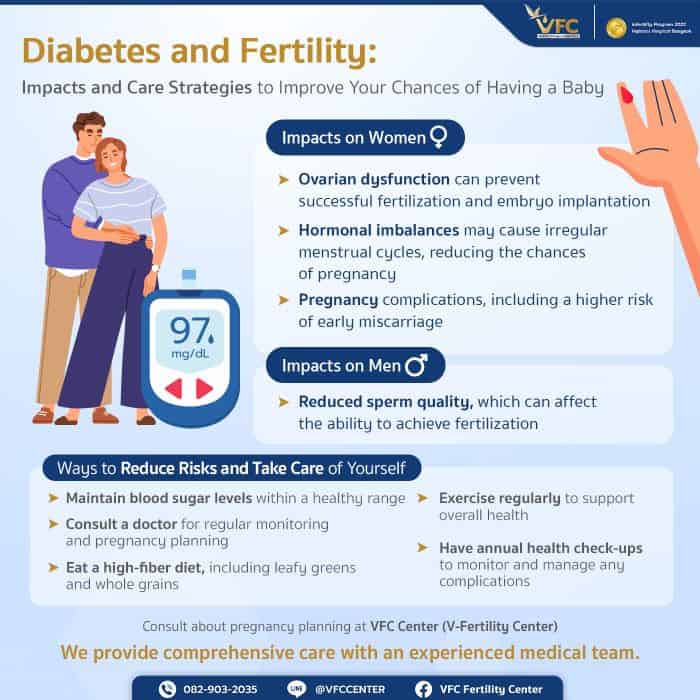
Diabetes doesn’t just affect blood sugar, it can also interfere with your body’s ability to conceive. For couples planning to have a baby, untreated or uncontrolled diabetes may lead to hormonal imbalances, reduced egg quality or sperm health, and complications in early pregnancy. That’s why integrating a thorough infertility screening into your preconception plan becomes essential. In this article, we’ll examine how diabetes impacts fertility, share strategies to manage those risks, and explain when to turn to specialist care at a fertility clinic in Bangkok.
Planning to have a baby is an important step for many couples. However, those at risk of diabetes or with high blood sugar levels may worry about its impact on pregnancy. This article explains how diabetes can affect pregnancy and offers tips to reduce risks and improve the chances of having a child.
What is Diabetes?
Diabetes is a condition in which the body cannot properly regulate blood sugar levels. This occurs either because the pancreas does not produce enough insulin, the hormone responsible for controlling blood sugar, or because the body’s response to insulin is reduced. As a result, blood sugar levels rise over time. There are two main types of diabetes:
Type 1 Diabetes
Type 1 diabetes occurs when the body completely lacks insulin. It is most commonly diagnosed in children or adolescents and is caused by the immune system attacking and destroying the insulin-producing cells in the pancreas. As a result, the body cannot produce insulin at all.
Type 2 Diabetes
Type 2 diabetes is the most common form of diabetes. It usually develops due to insulin resistance, meaning the body still produces insulin, but the cells cannot use it effectively. This type is often linked to genetic factors and lifestyle habits.

How Diabetes Affects Fertility?
Diabetes directly impacts fertility and pregnancy in both women and men as follows:
Impact on Women
High Blood Sugar Disrupts Ovarian Function
Excessively high blood sugar affects ovarian function, leading to incomplete egg development and reduced egg quality. This is a key factor that can prevent successful fertilization and embryo implantation.
Hormonal Imbalance
Persistent high blood sugar can cause hormonal imbalances, resulting in irregular or absent menstrual cycles, which reduces the chance of natural conception.
Egg Quality and Early Pregnancy Issues
Poorly controlled diabetes affects the quality of eggs produced, lowering the chances of fertilization. Even if pregnancy occurs, there is a higher risk that the embryo may not develop properly or may lead to a threatened miscarriage.
Impact on Men
Diabetes Affects Sperm Quality and Quantity
High blood sugar levels can reduce sperm quality in terms of shape, motility, and count. It may also affect blood vessels and nerve function, potentially causing sexual dysfunction, which is a major obstacle to successful intercourse and conception.

How to Reduce Risks and Care for Yourself When Planning a Pregnancy
Managing diabetes and maintaining regular self-care are crucial steps when planning to have a baby, as they can increase your chances of conception and reduce potential risks, as follows:
Control Blood Sugar Levels
Keeping blood sugar within a healthy range is essential when preparing for pregnancy. This involves managing your diet, exercising regularly, and following any medications prescribed by your doctor. The goal is to maintain an appropriate HbA1c level according to your doctor’s guidance before conception.
Consult Your Doctor for Monitoring and Pregnancy Planning
Couples with diabetes should consult both a diabetes specialist and an obstetrician to plan a safe pregnancy. Doctors can assess risks, adjust treatment plans, and provide close monitoring and guidance throughout the pregnancy planning process.
Eat a Healthy, Balanced Diet
Choosing the right food is important. Focus on high-fiber options such as leafy greens and whole grains, and reduce intake of sugar- and fat-rich foods to help stabilize blood sugar. Consulting a nutritionist can also help create a personalized meal plan that fits your individual needs.
Exercise Regularly
Regular physical activity helps your body use insulin more efficiently and maintain healthy blood sugar levels. Consult your doctor to choose the type and amount of exercise that is appropriate for your personal health.
Have Annual Health Checkups
Regular annual checkups provide a comprehensive overview of your health and can identify risks related to diabetes complications, such as heart disease or kidney problems, which may affect pregnancy. Thorough health assessments allow you to plan and address any issues promptly.
In addition to diabetes, many other health concerns should be monitored. Couples planning to conceive and seeking guidance on maintaining health, recommended checkups, infertility screening Bangkok, or embryo chromosome testing can consult VFC Center. We provide holistic care, from consultation and health evaluation to professional pregnancy planning, supported by an experienced medical team and advanced medical technology.
Article by Dr. Nantnapas Porosiyanon
For consultations or appointments, contact:
VFC Center – V-Fertility Center
Hotline: 082-903-2035
LINE Official: @vfccenter

The team of specialists in obstetrics and gynecology and reproductive medicine





No Comments
Sorry, the comment form is closed at this time.